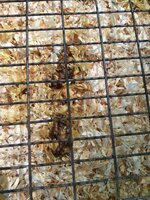I have been following guidelines for treating doughy crop.
I have dewormed with Flubendazole to make sure there is no underlying worm infestation. (I now suspect possibly gapeworm, as I now have another hen showing symptoms. *She is ok & I caught it day 1. Now everyone is being wormed.*)
BUT my calico cochin will not release the doughy crop. Even after wormer & twice daily spice mix & coconut oil/garlic mix (as an antifungal). She has been off feed & is being given electrolyte water. I massage her three times a day. Now I'm reading (on this site) if doughy crop won't release it could be a heavy cocci. infection. Should I now try to treat with Corid? She has not had a proper meal since 4/3 in the afternoon when I isolated her. I mix peas in with her coconut oil.
She is happy & verbal.
I'm just at a loss now as to what to do. Any help is appreciated. This is my daughters favorite chicken & I'm just feeling like a failure.
I do not have access for additional meds. We are quarantined. So I have flubendazole, Corid, my own fiber powder, spices, magnesium, etc.
I have dewormed with Flubendazole to make sure there is no underlying worm infestation. (I now suspect possibly gapeworm, as I now have another hen showing symptoms. *She is ok & I caught it day 1. Now everyone is being wormed.*)
BUT my calico cochin will not release the doughy crop. Even after wormer & twice daily spice mix & coconut oil/garlic mix (as an antifungal). She has been off feed & is being given electrolyte water. I massage her three times a day. Now I'm reading (on this site) if doughy crop won't release it could be a heavy cocci. infection. Should I now try to treat with Corid? She has not had a proper meal since 4/3 in the afternoon when I isolated her. I mix peas in with her coconut oil.
She is happy & verbal.
I'm just at a loss now as to what to do. Any help is appreciated. This is my daughters favorite chicken & I'm just feeling like a failure.
I do not have access for additional meds. We are quarantined. So I have flubendazole, Corid, my own fiber powder, spices, magnesium, etc.




